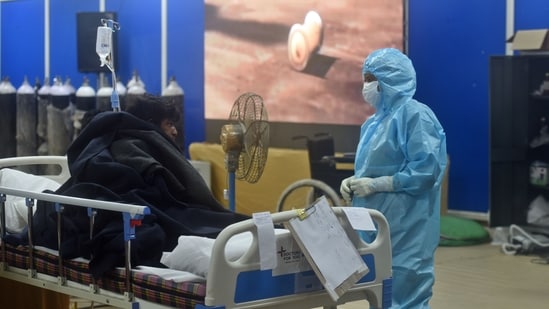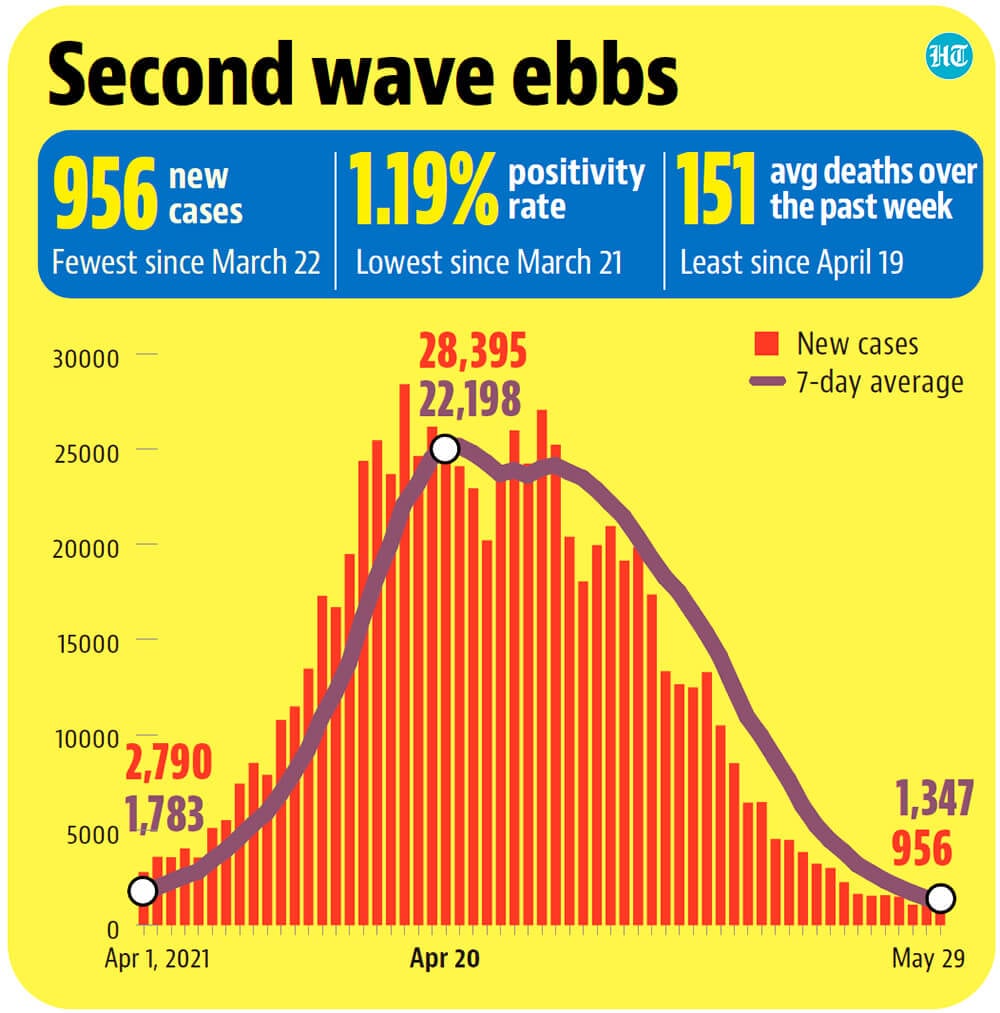Delhi’s new Covid-19 cases drop below 1,000
The Capital recorded 956 new cases of Covid-19, the lowest since March 22, when Delhi added 888 cases, and the test-positivity rate fell to 1.19%, according to the government’s daily health bulletin.
Delhi on Saturday added fewer than 1,000 cases for the first time in over two months as the city’s fourth and the worst wave of Covid-19 infections continued to taper, with government authorities now focusing on a phased withdrawal of lockdown restrictions while preparing in advance for another potential outbreak.

The Capital recorded 956 new cases of Covid-19, the lowest since March 22, when Delhi added 888 cases, and the test-positivity rate fell to 1.19%, according to the government’s daily health bulletin.
The city’s positivity rate – the proportion of samples tested returning positive – was under 2% for the fourth consecutive day on Saturday. This figure has been falling since first reducing to under 5% on May 21. The World Health Organization says a positivity rate under 5% indicates that the outbreak within a population is under control.
Saturday’s tally is an encouraging sign for the Capital that only weeks before saw its health care infrastructure buckle under the burden of a massive surge of Covid-19 cases.
Also read| Delhi will not get 550k alloted vaccine doses before June 10: Sisodia
“Yesterday, we announced that two activities -- construction activities and factories -- can be opened up because the poor such as migrant labourers have faced the most difficult time during the lockdown. Today, around 900 cases have emerged for the first time, I hope that as and when the cases keep on decreasing in the coming weeks, we will continue to unlock further. We want the economic activities to come back on track so that the economy can be revived,” chief minister Arvind Kejriwal told reporters during a visit to the city’s first drive-through vaccination centre at the Chhatrasal Stadium.
In keeping with the declining trend of daily cases and deaths, the Delhi government is lifting lockdown curbs in the city, starting with the construction sector and factories that can resume operations from Monday, June 1. Public health officials, however, say there is a need to remain cautious about unlocking of the city to avoid another flare-up of the pandemic in the next few weeks.
A weekend curfew in mid-April paved the way for a full lockdown to be enforced in the Capital from April 19. From then on, the restrictions – which forced Delhi to shut down all but essential services – were extended five times until the pandemic loosened its grip over the city May onwards.
At its worst, Delhi recorded 28,395 cases on April 20 and its test-positivity rate soared to a peak of 36.4% on April 22. Tragedy also unfolded in the third week of April that saw hundreds of patients and their families wait outside hospitals short of oxygen supply, and mass cremations at burial grounds that were running out of space.

The situation eased in early May as the central and the Delhi governments procured and replenished supplies of critical life-saving drugs and medical equipment.
Officials of the Aam Aadmi Party-led city administration say they have used the one-and-a-half-month lockdown to scale up infrastructure to prepare for a potential surge in cases in the months ahead. It has ramped up surveillance system to foresee a spike in cases, added hospital beds, increased oxygen supply and is keeping a stockpile of medicines needed to treat Covid-19 patients.
The city has recorded an average of 1,347 daily cases in the last seven days – a fair distance from the 25,294 cases reported in the week ending April 23.
Government data released on Saturday also said 122 people succumbed to the viral illness in the previous 24 hours. Fatalities, too, have seen a steady drop in recent days and the seven-day average of daily deaths is 151, the lowest since April 19.
Also read: Delhi restaurateur Kalra gets bail in oxygen concentrator case
Active cases are also at their lowest in 57 days, with 13,035 people currently battling the virus.
Despite conclusive signs of an outbreak in decline, the government has warned against complacency in lowering the guard. Delhi health minister Satyendar Jain on Saturday said in a tweet that although cases had fallen, people “still need to take all precautions and follow Covid-appropriate behaviour to beat the virus”.
Public health experts, too, stressed on the same but added that the government needs to plan the unlock process and keep in mind particular activities that can trigger crowding and close contacts. These may include re-opening marketplaces, gymnasiums, and even Delhi Metro services.
“You cannot open everything up all at once. You have to open up gradually... we should keep places where a lot of people can gather such as gyms, malls, cinemas, markets closed for now,” said Dr Amit Singh, associate professor, Centre for Infectious Disease Research, Indian Institute of Science, Bengaluru.
“I think the last time we opened up too soon and too much. I understand that the economy suffers, but this is the only measure we have in the absence of vaccines for everyone. It will take some time for doses to become available and for the people to be immunised. We have to maintain restrictions, especially for weddings and all,” said Dr Lalit Kant, former head of the department of epidemiology at the Indian Council of Medical Research.
Also read: Soon, breeze through immigration ‘e-gates’ at IGI airport
They also pointed out that lockdowns are effective in lowering transmission but these are still stop-gap measures; eventually, vaccination will be key to clamp down on the infectious disease.
“Doses are not available as of now, but it seems like more shots may be available June onwards, after which there should be aggressive vaccination. That is the only hope for preventing another surge,” Singh added.
A similar stand has been taken by the Delhi government, which has flagged acute shortage of vaccine doses in recent days.
On Saturday, deputy chief minister Manish Sisodia said the government has run out of shots to inoculate younger adults and it will be given doses by the central government only by June 10.



